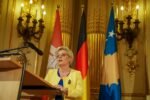Representatives of Kosovo and Serbia are expected to send their comments on the implementation path of the agreement for normalizing relations, which the parties agreed upon last year in Brussels and Ohrid, to the European Union mediators by July 18.
The last two meetings in Brussels between the leaders of Kosovo and Serbia and at the chief negotiator level of both sides aimed at unlocking the implementation of the agreement ended without any result.
It should be noted that in the last meeting, Kosovo’s Prime Minister, Albin Kurti, presented three conditions for further engagement in the process of normalizing relations with Serbia.
Kurti’s conditions were the formalization of the Basic Agreement through the signing by the respective leaders of both states, the withdrawal of the official letter submitted to the EU by former Serbian Prime Minister Ana Brnabić on December 13, 2023, and the handover of Milan Radoičić and his paramilitary “terrorist” group to Kosovo’s judicial authorities.
These conditions were widely commented on, along with the continuation of the dialogue.
Regarding the Kosovo-Serbia dialogue process and Kurti’s conditions, German MP Knut Abraham spoke in a statement to “Bota Sot.”
Firstly, he mentioned the Ohrid agreement and some of its articles, which Serbia has not adhered to.
“The Ohrid Agreement states that ‘The parties will resolve any disputes between them exclusively by peaceful means and will refrain from threats or use of force’ (Article 3); ‘Serbia will not oppose Kosovo’s membership in any international organization’ (Article 4); and ‘Neither party will block nor encourage others to block the progress of the other party’ (Article 5).
Since the approval of the agreement, Serbia has kidnapped three Kosovo police officers, Serbian paramilitaries including Radoičić have violently attacked and killed a Kosovo police officer in Banjskë without consequences, and Serbia has actively lobbied against Kosovo’s membership in the Council of Europe,” stated the German MP.
Furthermore, Abraham supported Kurti’s conditions, describing them as crucial for restoring trust in the dialogue.
“Therefore, it is understandable that Prime Minister Kurti wants to continue the dialogue only if Serbia acts in good faith and fully commits to what has been agreed. The three preconditions (signing the agreement, withdrawing Serbia’s reservation letter, and handing over Radoičić) required by Prime Minister Kurti would be a significant step to restore trust.”
Additionally, the German MP emphasized that the dialogue is becoming redundant, considering Serbia’s approach and the fact that Radoičić is still at large.
He even said there is a risk that Serbia might use violence again.
“However, as long as Serbia refuses to sign the agreement and actively goes against it, the dialogue becomes redundant. And as long as Radoičić does not face justice and the perpetrators of Banjskë enjoy immunity, the concern remains that Serbia might use violence again instead of dialogue to achieve its political goals. It would be in the interest of all parties to meet these conditions if the ultimate goal is the normalization of relations.”







